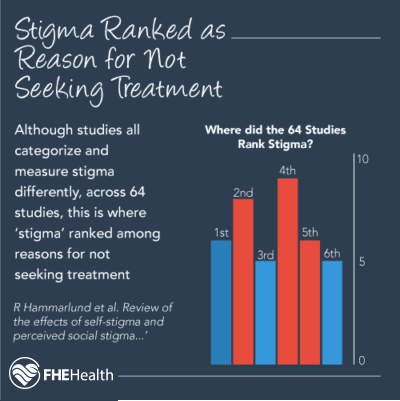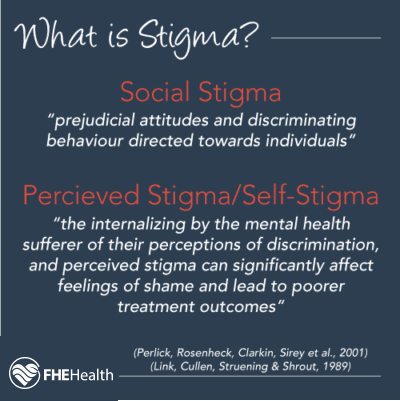
Updated August 2023
Substance abuse treatment is an effective way to break free from drugs or alcohol, but the stigma that surrounds seeking out treatment might prevent some people from getting the help they need. A recent research review published in the journal Substance Abuse and Rehabilitation looked at the effects of stigma on people who abuse drugs and alcohol. The authors found a wide range of effects across the 64 studies reviewed, and they found that stigma probably has some impact on treatment-seeking but isn’t necessarily the most important factor involved.
Types of Stigma
Substance abuse stigma can be defined as a negative label or stereotype attached to people struggling with addiction. You may experience stigma for actual drug or alcohol use or get stigmatized for going to rehab.
Stigma may manifest itself through negative stereotypes, prejudices and blatant discrimination. Regardless of how it manifests, stigma can and does prevent people from seeking or accessing addiction treatment.
Research has identified five types of stigma associated with substance use and treatment.
Public stigma refers to a society’s beliefs, myths and general attitudes toward mental illnesses such as substance abuse. People around you may stereotype those struggling with substance abuse as incompetent, weak and dangerous, reacting in fear or anger toward them. Studies on the impact of stigma on people with mental illnesses found that social avoidance and discrimination are often the consequences of public stigma, with over 50% of people being unwilling to work or socialize with people with mental illnesses.
When contemplating treatment, some people point to the lack of empathy that’s evident in their community. They fear that acknowledging their substance addiction will trigger public condemnation. They are aware of the derogatory terms associated with addiction; terms like “addict” or “abuser” suggest that stigma continues to be a factor in the overall community at large.
2. Perceived social stigma occurs when people go to someone for help and encounter negative public attitudes about addicts. In some cases, doctors or social workers might think people with an addiction are manipulative or violent. Or they might believe that they don’t have the motivation and willpower needed to change.
A person might be hesitant to communicate their drug or alcohol abuse problem because they perceive that it will change the way people think about them. They fear disappointing their family and friends. Unfortunately, they may fear this type of stigma so much that they go to great lengths to maintain their secrecy when, in reality, admitting their problem and seeking help is the best possible course of action that can be taken to preserve their health and future.
Self-stigma develops when a person with a substance abuse problem internalizes those negative messages from caregivers or society in general. This can lead to self-doubt about the possible success of treatment and self-questioning about whether treatment is even worth trying.
A person who becomes addicted to drugs and alcohol may certainly have had their own notions about addiction before they found themselves in their present situation. They may apply their own perceptions about “being addicted” to others. If they had a low opinion of others who became addicted to drugs and alcohol, they may easily apply that opinion to themselves.
However, having a negative self perception can be self-defeating; it can actually be a trigger for continued drug and alcohol abuse. That individual may begin to feel worthless as well as powerless to make positive changes in their life.
Professional stigma is a real concern for people who are contemplating entering a rehab center for help. In fact, it’s a leading reason why people put off getting treatment. Not only do people fear the stigma attached to drug addiction and alcoholism; they may fear a real financial consequence as a result of getting treatment– even if their medical insurance covers such treatment.First of all, they aren’t wrong. It would be naive to believe that an employer and/or colleagues understand substance abuse disorders or are supportive of one’s treatment— even if, yes, in a perfect world, coworkers would behave professionally and do their part to help reduce stigma. Nevertheless, positive shifts are occurring in the workplace; and, progress is happening, thanks to public awareness campaigns and legislation that now requires medical insurance carriers to provide equal coverage for substance abuse and mental health treatment.The fear a person feels regarding workplace stigma is real and matters. However, there are ways to protect one’s privacy when getting treatment. Moreover, it’s never a good idea to allow fear to govern decisions. A career is important, but not as important as one’s health. There are workplace protections in place for people who seek medical care for any health condition. Furthermore, there are employers who will support and encourage their employees to seek the treatment they need— and not use their condition against them when making workplace decisions such as promotions.
All of these types of stigma can make someone more reluctant to seek treatment.
The Impact of Stigma on Getting Treatment
 In most cases, stigma isn’t the main reason people cite for avoiding treatment. The review found cases where study participants ranked stigma anywhere from the most to the 8th-most-relevant barrier. In cases where stigma was on a list of possible barriers, participants also listed plenty of other things. Some things that the researchers identified as having a greater effect than stigma include:
In most cases, stigma isn’t the main reason people cite for avoiding treatment. The review found cases where study participants ranked stigma anywhere from the most to the 8th-most-relevant barrier. In cases where stigma was on a list of possible barriers, participants also listed plenty of other things. Some things that the researchers identified as having a greater effect than stigma include:
- Not recognizing the existence or extent of the drug or alcohol problem
- Not being ready to stop using drugs or alcohol
- Having other negative attitudes about treatment
Essentially, stigma isn’t typically the sole or primary reason people avoid seeking treatment for substance abuse. It can have an impact, though, when multiple stigmas are present from multiple sources. The effects are even more striking if the attitudes come from a medical provider or rehabilitation center staff member. Barriers to treatment add up, so it’s important to tackle treatment resistance from a variety of angles.
Dealing With and Overcoming Stigma
Because stigma ties in with other factors to make people reluctant to get help, addressing and reducing stigma helps smooth the path into treatment. Yes, stigma can be a powerful barrier to getting the crucial help someone needs to end their dependence on drugs and alcohol. In point of fact, overcoming stigma is a vital part of the recovery process for many individuals who have been influenced by some form of stigma.
How might someone new to or considering recovery overcome stigma?
Changing the Stigma
Changing the public’s perception of addiction and people dealing with it is key to supporting individuals on their recovery journeys. One of the drivers of negative opinions toward addiction is the language used to refer to people with the condition. Many people with substance abuse problems don’t want to be identified as “addicts” or “junkies” because these labels carry a stigma.
Education is a research-backed strategy for reducing public stigma and resulting discrimination toward people with mental illnesses. People who understand that addiction is a diagnosable and manageable health condition like any other are less likely to stigmatize those struggling with it.
Education can also change how you see yourself and increase your willingness to undergo lengthy treatment in an inpatient or controlled setting. Education on different forms of addiction treatment can also make you receptive to a range of programs, including mindful or alternative therapy for addiction.
One point noted in the review was that many people with substance abuse problems don’t want to be identified as “addicts” or “junkies.” The labels themselves carry a stigma, and some people may avoid longer stints in treatment or any form of treatment at all, lest they be considered part of that group. In other words, avoid labels, whether that’s in the form of labelling others or yourself.
Another thing one might do is keep their healthcare information private. Your colleagues and supervisor don’t need to know that you are struggling with a drug or alcohol problem and/or other mental health symptoms. You are just as entitled to take time to get the treatment you need as someone battling another illness.
It’s also helpful to attend support meetings in order to spend time with people who refrain from stigmatizing thoughts or behaviors. A person should also practice self-care and remind themselves that getting treatment is empowering and worthy of the utmost respect and self-respect.
Finally, when considering where to go for treatment, be sure to evaluate the staff at any prospective facility and whether they are kind, compassionate, and non-judgmental, in addition to being licensed and qualified. The study mentioned earlier found that non-judgmental attitudes from staff at a rehabilitation facility seemed to have a strong ability to counter the negative effects of stigma. A caring, compassionate staff reduced self-stigma and negative emotions about treatment, showing the strong impact that the right residential program can have.
To learn more about getting treatment in a supportive environment free of stigma and judgment, call FHE Health today.







